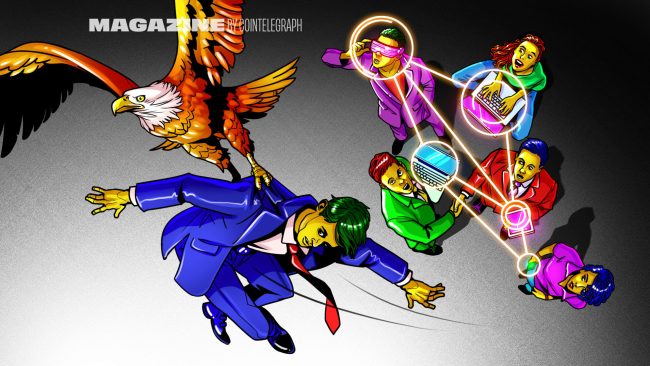Buying DAO tokens? That’s no longer risk-free: Courts might consider you a partner in the business and judge you liable for millions in hacked funds. Another legal trap may be found simply working for a DAO — and implementing community decisions that turn out to be illegal in some far-flung jurisdiction.
With many DAO communities waking up to the reality that they need some sort of legal structure or “legal personality” in order to act in the real world, solutions from mimicking corporate structures to anonymously run foundations are being floated by lawyers around the world.
Nothing in this article should be construed as legal advice — and not just because the law isn’t clear about any of it.
Code is law?
In 2021, Magazine interviewed Griff Green, whose heroic actions to thwart The DAO hack on the morning of June 17, 2016, helped save a good proportion of the 14% of Ether in existence at the time. By identifying how the exploit worked, his team of hackers worked to “steal” faster than the malicious actor, thus limiting the amount taken by the individual who discovered the error in The DAO’s code. But who did this ETH belong to?
Did it belong to the 11,000 investors who had contributed Ether toward the project in the previous month? If so, what claim did they have, considering that these “investors” had handed their money to an organization without leaders or jurisdiction, governed entirely by smart contracts that operated according to the votes of investors?
Or did it belong to the “malicious hacker” who simply interacted with the publicly available smart contract in a way that allowed them to withdraw Ether? Many would argue this is perfectly legal as per the “code is law” mantra.
Since The DAO had no legal personality, by what law could it hope to pursue the hacker, even if they were identified? The same goes for the “investors” — how could they claim that the stolen Ether was theirs, given they made no legal agreements and signed no contracts when making their investments?
Perhaps the Ether that Green’s team got a hold of was now rightfully theirs? Green acknowledges that he took “a huge risk” with the preemptive stealing of 10% of the Ether in circulation and recalls how as word spread, a multitude of legal threats poured in demanding how the recovered funds should be distributed despite the fact that “we were just normal people; we didn’t have a company.” Eventually, Green’s team returned the funds through a decentralized application.
These questions are just now beginning to be tested, with one of the first (developing) cases to emerge being that of Ooki DAO, accused of breaking the “Commodity Exchange Act (CEA) by allowing users to engage in retail commodity derivative trading transactions” without registering the platform or conducting KYC procedures. In January 2023, the judge found Ooki to be an “unincorporated association comprised of Token Holders,” which could be sued in the same way as a person or corporation — and that it could be served by posting a notice onto the DAO’s online community forum.
Another recent example of pitting code against law can be found in the case of Avraham Eisenberg, who in December 2022 was arrested on the request of U.S. authorities in Puerto Rico for having run a “highly profitable trading strategy” that effectively exploited the smart contract of Mango Markets, a decentralized finance DAO — draining it of $110 million.
He claimed the whole exploit was perfectly legal under the “code is law” mantra, but the FBI disagreed. The case is yet to be tested in court.
Partnerships, foundations or corporate wrappers?
When it comes to DAOs, The DAO can be understood as the original example upon which the concept is based. As such, The DAO is often considered an ideal example of what a decentralized autonomous organization is supposed to be: cryptographically decentralized with no real-world anchor, its operations automated by way of smart contracts, and organized by way of blockchain governance.
In practice, however, “courts may interpret DAO structures as General Partnerships, which have unlimited joint and several liability for all participants,” observes Jason Corbett, managing partner of blockchain-specialized boutique law firm Silk Legal.
Jonathan Turnham, a partner at Cayman Islands law firm Travers Thorp Alberga, spends 95% of his time working on crypto law and agrees that it’s complicated. He explains that, in theory, a truly decentralized DAO that functions as a decentralized exchange or…
cointelegraph.com
